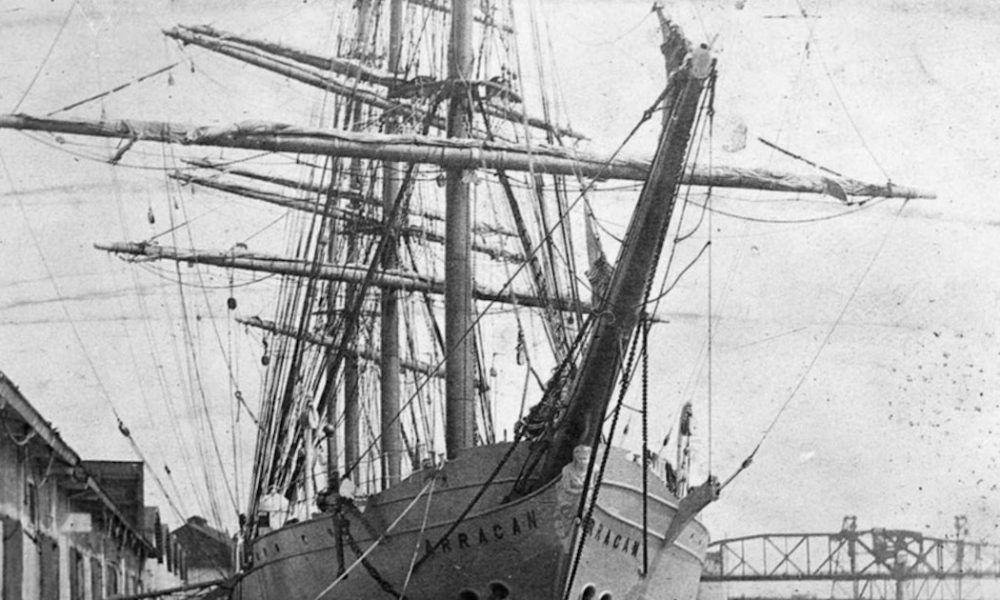 The four-masted barque Arracan, one of the last of the British grain fleet in Portland, moored below the Broadway Bridge about 1913. Image/ Salem Public Library
The four-masted barque Arracan, one of the last of the British grain fleet in Portland, moored below the Broadway Bridge about 1913. Image/ Salem Public Library
The election of 1904 didn’t end the practice of shanghaiing in Portland, but it did put a huge and (eventually) fatal dent in it.
Larry Sullivan, the socially poised and politically connected prince of the crimping-and-kidnapping industry in Stumptown, was on the ballot that year, seeking a City Council seat representing the old waterfront North End neighborhood (known today as Old Town). And it never seriously occurred to anyone, including himself, that he might lose.
He lost.
More importantly, Portland mayor and former U.S. Attorney General, George Williams – known colloquially as ”Wide Open Williams” – was replaced by determined progressive reformer, Harry Lane.
Multnomah County had, the previous year, replaced its former sheriff with Tom Word, another progressive reformer, whose attitude and zeal for the job is nicely summarized by a probably-true story told about him: One day, while being driven through town on official business in an open carriage, he caught a whiff of opium fumes. Leaping from the moving vehicle with his nose in the air and sniffing about like a beagle at the county fair, he found the scent again, followed it upwind to a nearby secret opium den, kicked in the door and started arresting people.
In the ”good old days,” a sheriff like that would have found himself on the outside of Portland society, cut off from all re-election support, counting down the days until his term was over and raging at the lack of enthusiasm with which the line cops implemented his policies and undertook his raids.
Not in 1904.
Sullivan, always well connected to the heartbeat of Oregon politics, knew what it all meant. The crimping business was a whisper away from human trafficking; it was only really tolerated because it preyed on the morally powerless. If reformers were coming for the gamblers and the hookers, they were certainly coming for the kidnappers.
He made one more attempt to transition to a new line of work – taking a tip from East Coast mobsters and trying, in partnership with the chairman of the state Republican Central Committee, to set himself up with the exclusive franchise to haul Portland’s garbage. When word of this scheme leaked out, though – a job the proudly Democratic Oregon Journal was happy to help with – the public outcry killed the plan.
At that point, Sullivan folded his cards and raked in his remaining chips. He sold his share of the Portland Club – his tony but illegal gambling parlor – to fellow Portland businessman Nathan Solomon, then pulled up his stakes and folded his tent and headed for Goldfield, Nevada. Fellow crimp Peter Grant went with him.
Left behind to represent the Portland crimping scene, much to his probable surprise, was Harry ”Shanghai” White – one of the White brothers formerly in partnership with ex-world-champion boxer ”Mysterious Billy” Smith, whose feud with Sullivan a few years before had only ended when he came to Sullivan hat in hand and asked to join up with his operation.
It probably also surprised White when he found that the state Sailors’ Boardinghouse Commission, which he had feuded bitterly with when it was under Sullivan’s effective control, had now become his best friend in the world. Although the state Supreme Court had stripped it of its power to enforce a monopoly in favor of Sullivan, it had learned that the difference between a prohibited monopoly and an allowable one was – well, just the word ”monopoly.” All that was necessary to accommodate the justices’ conscience was to stop calling it that, and start inviting other would-be boardinghouse operators to apply, and finding an excuse to deny every serious applicant.
Time passed. The Lewis & Clark Centennial Exposition came and went. Some of Harry Lane’s reforms took. The Portland Club was raided and shut down, a month or two after the club got caught using marked decks. Ex-mayor Williams’ policy of leaving the hookers and crimps and three-card-monte sharks alone as long as they stayed in the North End had given way to Lane’s policy of breaking down doors and hauling people off to jail, with the result that the vast majority of underworld entrepreneurs (and entrepreneuses) spread out all over the city to make themselves harder to find. And the North End started its long stumbling journey toward respectability.
Then, in 1907, a trio of interesting developments took place that probably constituted the last gasp of the go-go kidnapping era in Portland.
First, Joseph ”Bunco” Kelley was pardoned out of the state prison, into which he had been tossed in 1894 to serve a life sentence for murder in connection with the attempted kidnapping of an old saloonkeeper named George Sayres. The rap was, as almost everyone had by then figured out, a frame-up engineered by Larry Sullivan to get Kelley out of the way – although Kelley surely had accidentally killed one or two shanghaiing victims over the years, Sayres wasn’t one of them.
Proclaiming his intention to live an upright, God-fearing life from now on, Kelley started wandering around the city looking for ways to earn the money to publish his book, which he had written in prison. He found that he was getting by, but only barely; when he’d gone to prison he’d been the most famous bad guy in Portland, but 13 years later nobody seemed to even recognize his name.
Meanwhile, prizefighter Charles Jost – yes, another prizefighter – was starting to realize that he wasn’t ever going to make any money as a boxer. For seven years he’d been living the life, ever since 1900 when he won the title of welterweight champion of Oregon; but by 1907 he was looking for something else to do with his life and his skills.
At the same time, ”Mysterious Billy” Smith, of all people, was also at loose ends. He’d been running a saloon for Larry Sullivan, but Larry was gone now; and apparently Billy was doing a little pining for the good old days.
Somehow these three characters ended up at the same table at a bar, talking about the old times. They were probably in Erickson’s Saloon, because ”Jumbo” Riley, the 300-pound ex-boxer (heavyweight, of course) who worked there as a bouncer, was also at the table, as was Jost’s brother.
The conversation soon turned to the inadequacy of White’s remaining boardinghouse operation to handle all the crimping business for the port. The problem was, in the previous few years, it had become pretty obvious that the Boardinghouse Commission was not friendly to the idea of anybody lending a hand in slaking the market. Which was unfortunate, because the more the five of them drank, the more they realized that they were just the fellows to slake it.
By the end of the evening, the boys had a plan: Charles Jost would apply to the boardinghouse commission for permission to enter the market, under the name ”Jost Brothers” – the bunch of them having astutely figured out that everyone else’s name was so thoroughly tainted by underworld associations that the response would be an automatic ”no.”
But they apparently didn’t realize how much of a drag those names would be on their prospects. During the old Larry Sullivan days, the crimping and kidnapping in Portland had gotten so bad – that is, so expensive for ship captains – that the freight companies had hit the city with a beefy freight-differential surcharge. Farmers who had the choice of sending their produce to Tacoma instead of Portland suddenly were finding it saved them money to do so. Business in the port suffered.
In 1907, that differential had just finally been lifted. Port authorities were in no mood to jeopardize that by letting Bunco Kelley and Mysterious Billy back into the business.
So the commission made a deal: The boys could get into the business if they’d promise none of the old ruffians would be involved, directly or indirectly; if they’d fix up their boardinghouse so that it was suitable for sailors to live in; and if they’d put up a $5,000 bond.
The boys agreed. But then, perhaps thinking it would be no big deal to jump the gun a bit, they shipped a crew of sailors on the sailing ship, Elginshire.
As any real Portland businessman could have told them, it was a bad move. Hell hath no fury, as the old joke goes, like a bureaucrat scorned.
”SHIPPED SAILORS WITHOUT A LICENSE,” screamed the headline on Page 14 of the Oregonian the next day. ”Jost Brothers Violate their Agreement with the State Board. BOTH TO BE ARRESTED.”
”In shipping the sailors on the Elginshire the Jost boys have violated every article of agreement entered into between the members of this commission and themselves,” board member William McMasters told the Oregonian’s reporter. ”We shall proceed against them immediately.”
McMasters said the boys had presented their boardinghouse to the board, and it had been deemed inadequate. Plus, he said, board members had learned that Bunco Kelley, Mysterious Billy and Jumbo Reilly had all been involved in recruiting the sailors the Jost brothers had shipped.
Well, that was the end of that. The Jost brothers tried again in 1908, but the board simply told them no, that it didn’t think it was a good idea; and the brothers seem to have had enough sense to quit at that point.
For the remaining waning years of Portland’s age of sail, White’s boarding house would be the only game in town.
(Sources: The Oregon Shanghaiers, a book by Barney Blalock published in 2014 by The History Press; archives of the Portland Morning Oregonian, July 1907 and January 1908.)
Finn J.D. John teaches at Oregon State University and writes about odd tidbits of Oregon history. His book, Heroes and Rascals of Old Oregon, was recently published by Ouragan House Publishers. To contact him or suggest a topic: [email protected] or 541-357-2222.








